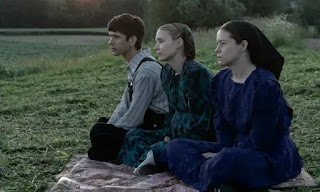This week’s adventures in film
Women Talking
Incredibly elusive film this, so I ended up going to Saturday morning pictures to catch it. Very much my cup of tea though. Debate on ethics and morality, with a great cast and an emotional thwack thrown in for free? Count me in!This is a fictional imagining of what might have happened after a real life event where 150 women were systematically drugged and abused by the male members of a Mennonite Community in Bolivia. The women are gaslit to believe the attacks are 'female imagination'. Once the abuse is discovered, the men of the community head away to town to bail the accused from jail leaving the women with an ultimatum. Either the women forgive their abusers, or if not, they should leave and will never enter the Kingdom of Heaven. The next hour and a half on screen is the debate amongst the women to decide what to do.
As a response to #MeToo, I found it really effective in covering the issues without going in head on. What does forgiveness mean if you are penalised for not giving it. Should you stay and fight, or leave? How much responsibility should you have for the people who are hurt by your silence? What about the men (and women) who knew and stood by? And what about those young men already indoctrinated - is it too late to save them? Can education help? Can allies make a difference if it isn't happening to them? Multiple sides of the debate are explored and given time to breathe before being agreed or rejected, in a way that you don't see often enough on screen. It reminded me a lot of The Crucible in the structure and chance to think about the issues from different sides. It shouldn't just be seen through the #MeToo lense though. The debate also captures what freedom and agency means, what is a good life, what is the importance of identity and the value and risk of being able to think and decide for yourself. Who are you if you have no power?
The characters that we meet illustrate the spreading impacts of the abuse. There are older women who have to come to terms with their complicity and acceptance, the mothers fearful for their children, and all the children are given space too, as is a boy who used to be a girl. The only male voice is August (Ben Whishaw) who is an outsider whose mother rejected the community after questioning it. But he came back, so does that make him an enemy or an ally? Are all men bad? Ultimately though the few women in the room make the tough decisions for all.
It all sounds a bit dry, but the writing and performances are brilliant - Claire Foy as the vengeful Salome and Jessie Buckley as Mariche do the most outstanding work here, but it is as an ensemble as this really works, with all building on each other. Ben Whishaw does a brilliant, sensitive job as the schoolteacher chosen to minute the women's discussion, who has the impossible job of treading the line between his allyship, sympathies and love for the women and maintaining his place in the community.
I can see why this didn't win the Oscar - too static and cerebral probably, but this is a really really great film that deserves to be seen more widely than a sparsely populated cinema on a Saturday morning.
Portrait of a Girl on Fire
Just a lovely love story between two young women, with a tiny main cast of just four women; the mother, the daughter being married off to a rich suitor after her sister who was first choice dies, the artist hired to paint the bride-to-be so that the groom can decide whether to accept her, and the maid. Brutal in the pernicious choices open to these women, and the grim consequences that the women face through no fault of their own.This looks and sounds beautiful and the pace and subtlety of the storytelling is a joy to watch. A great ending too which reminded me a bit of Call Me By Your Name but did a better job of it.
Blue Jean
Set as the tide of homophobia and moral panic is growing in Thatcher's Britain of the 1980’s, Jean is a closeted school teacher and despite her view that not everything is about politics, section 28 is just about to be introduced anyway. A film about hypocrisy and betrayals and the cost of hiding, which feels very timely in this time of transphobia and newly generated moral panics. A good reminder that things don’t always go forward unless we fight, or even, as the film reminds us, even if we do fight.The storytelling was a bit light in places, and I felt a bit left in the air at the end, wanting to know what Jean was going to do, but the point is well made that keeping quiet and ignoring injustice is never good.



Comments
Post a Comment